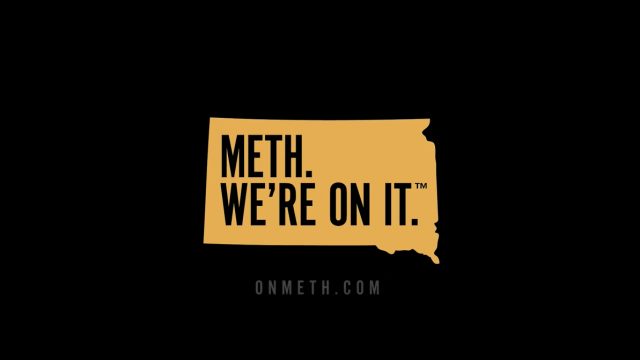South Dakota’s “We’re on Meth” Ad Is Hokey, but the More Important Question Is Whether These Ads Even Work

South Dakota’s on meth.
I could insert a joke here about how North Dakotans knew it all along, but I’m above that sort of thing. [Editor: Really, Port?]
The truth is that methamphetamine is a real problem in our part of the world, and South Dakota’s ad campaign is (love it or hate it) part of a genuine effort to do something about it.
Here’s the ad, if you haven’t seen it:
The spot caused the internet to roll its collective eyes, but online cynicism shouldn’t really matter.
What should matter is whether or not this ad campaign, or others like it, measurably further the public’s interest in addressing drug abuse.
I’m not sure they do, despite billions upon billions of federal, state, local tax dollars spent on them.
It’s not that these ads don’t make an impact. I’m sure we can all remember anti-drug PSA’s from our childhood. I still cutting up with my friends about the “this is your brain on drugs” ads from the late 1980s. But if they’re not preventing drug abuse, if they’re not helping people with addiction issues find help, what’s the point?
“Although the U.S. government has spent more than a billion dollars on funding anti-drug public service announcements since the 1980s, there’s little evidence to show that anti-drug PSAs pay off,” Marketplace reported earlier this year.
In 2006 the Government Accountability Office found that a $100 million Bush administration anti-drug campaign was a failure. “The evaluation provides credible evidence that the campaign was not effective in reducing youth drug use, either during the entire period of the campaign or from 2002 to 2004 when the campaign was focused on marijuana use,” the report said.
A 2015 report took a look at 19 studies into the effectiveness of anti-drug public service announcements. The results were a mixed bag. Some studies say the ads work, others say they don’t.
Unfortunately, this area of public policy doesn’t really get much scrutiny. The politicians love PSA campaigns because they’re low-hanging fruit. Social problems like substance abuse are hugely complicated. They do not have simple solutions. Yet they do grab the public’s attention. A PSA campaign is something understandable and straightforward a policymaker can point to and say hey, look, we’re doing something.
The news media love PSA campaigns because they’re advertising. That sort of thing is how the news media makes money.
The advertising industry loves the ads too because, hey, advertising is what they do for a living.
South Dakota’s meth campaign cost about $449,000. That’s not a large sum of money as far as advertising campaigns go, but that’s just one campaign. Every state in the union is running anti-drug campaigns. For instance, Flint Group, a marketing company based in Fargo, won the bid for the Recovery Reinvented campaign launched by North Dakota Governor Doug Burgum’s administration. The cost was $445,000.
All that spending, both at the state and national level, adds up. But at some point, shouldn’t we get a definitive answer on whether or not any of this works? An answer more enlightening than…maybe?
I’m not against PSA’s. For instance, North Dakota has the FirstLink 2-1-1 line which people dealing with everything from trouble paying utility bills to suicidal thoughts can call and find help. It’s a wonderful service, but it only works if people know it exists. Marketing that sort of thing, I think, is appropriate.
But some of these other marketing campaigns, such as South Dakota’s? They need a closer look, I think.




